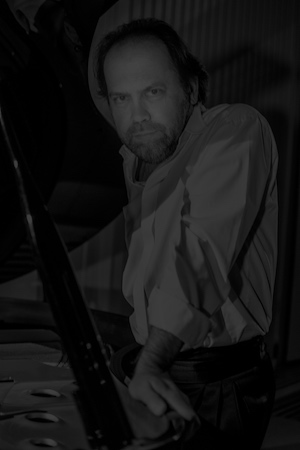Paweł Kamasa studied piano with Rudolf Buchbinder, Jorge Bolet and Harry Datyner. Since his German debut at the Kissinger Sommer Festival in 1987 he has performed in major European centres including the Salle Gaveau in Paris, the Tonhalle in Zurich, the Warsaw Philharmonic and the Tchaikovsky Conservatory in Moscow. As a soloist he appeared with outstanding conductors such as Jan Krenz, Eivind Gullberg Jensen, Tadeusz Wojciechowski, Marek Pijarowski, Tomasz Bugaj, Wilfried Boettcher and Karol Teutsch. He has been invited to participate in numerous international festivals, including Chateauneuf-du-Pape, Mulhouse, St.Savin, Evian, Munich Biennale, Zakopane Szymanowski Festival, Chopin Festivals in Warsaw, Geneva and Antonin.
Paweł Kamasa was the very first pianist ever to perform the complete cycle of Mazurkas by Karol Szymanowski in Paris (1994). His recording of this Oeuvre for KOCH/Schwann in Munich was very much praised by Gramophone London, and received the „Critic’s Choice Award ’98”. 2015 a new 2CD-set dedicated to the complete late work for piano solo op. 116-119 by Johannes Brahms has been released by DUX Recording Producers.
Having been a formative factor in his musical development, chamber music continues to play an important role in Paweł Kamasa’s activities. He has appeared with the most distinguished soloists and ensembles in Europe, among them the Amati-, Wilanow- and Szymanowski String Quartets.
In 2009 he was appointed artistic director of the international piano festival „Chopin – Inspirations. 1810 – 2010”, which has been praised as one of the most original projects of the Chopin-200th-anniversary- year in 2010.
Paweł Kamasa is a passionate pedagogue too. From 1997 to 2000 he led the piano and chamber music class at the Conservatory of Schaffhausen/Switzerland, 2012/13 he was visiting professor for piano chamber music at the Feliks-Nowowiejski-Academy of Music in Bydgoszcz/Poland. Since 2012 he has been leading a class for both piano and piano chamber music at the Josef Elsner Institute of Music in Warsaw/Poland, and he continues his teaching activity by giving master classes and lectures. Since 2017 he has been serving as a jury member of the International Johannes Brahms Piano Competition in Pörtschach/Austria.
Seeking new forms of music presentation, Paweł Kamasa has performed his lecture-recital „Mazurka – from Chopin to Szymanowski” in German, Polish and English throughout Europe and overseas (South Africa tour 2007). Since 2008 he has been performing a programme called „Letters of music”, devoted to Johannes Brahms’ late works for piano accompanied by the correspondence of Clara Schumann to the composer in Kamasa’s own translation into Polish. In 2012 he presented it with great acclaim in its language of origin to the public in Germany.

